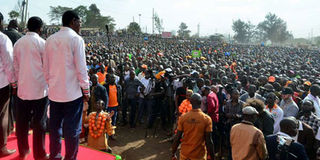Sacredness and politics behind historic grounds

National Super Alliance co-principals present themselves before their supporters at Kamukunji grounds on July 7, 2017 to make Saba Saba Day. Kamukunji grounds is regarded as historic. PHOTO | FRANCIS NDERITU | NATION MEDIA GROUP
What you need to know:
- There was a tussle between Governor Oparanya and Senator Wetang’ula over use of Muliro Gardens.
- It is at Kapkatet grounds where William Ruto was installed as a Kalenjin kingpin in the run up to the 2013 elections.
One of the reasons why a section of elders in the Rift Valley, in particular the Kipsigis Myoot Council of elders, took issue with the installation of Bomet Governor Isaac Ruto as the Kipsigis community spokesman was because it did not take place at the right place - Kapkatet stadium.
Governor Ruto was in June installed as the Kipsigis spokesman by the Kipsigis Clan Association during a rally attended by National Super Alliance (Nasa) leaders at the Bomet Green Stadium.
POLITICAL
Nasa Presidential flagbearer Raila Odinga termed the installation as significant, saying it would further elevate Governor Ruto’s status and dent Deputy President William Ruto’s influence in the region.
But the elders immediately rushed to quash its significance saying the installation was political and that the members of the community should ignore it.
Bishop Paul Leleito, a member of the Myoot Council, said was only the council that has a mandated to install elders of the community and not any other.
HISTORY
He added that to be genuine, the ceremony also had to take place at the historic Kapkatet grounds in Kericho County.
The Kalenjins hold the Kapkatet grounds dear, having used it to make several historical declarations that marked a political breaking points including the decision to join Mzee Jomo Kenyatta’s Kanu party in 1963 from Kadu, which was led by President Moi.
It is also where Deputy President William Ruto was installed as a Kalenjin kingpin in the run up to the 2013 elections.
MULIRO GARDENS
A similar fight about a historic venue broke out in March 2016 pitting Kakamega Governor Wycliffe Oparanya’s supporters and those of Bungoma Senator Moses Wetang’ula over use of Muliro Gardens.
There has been a protracted tussle between the two leaders with Mr Oparanya vowing to block Mr Wetang’ula from using the grounds to launch his 2017 presidential bid under his Ford Kenya ticket.
IMPORTANCE
The governor, who is also the ODM Deputy party leader, had told off Mr Wetang'ula’s aspiration as a big falsehood that should never be launched in a serious historical garden where bigger declarations that determine the lifeline of the community are made.
He further advised him to take the meeting to his Bungoma County or some grounds in Nairobi if he at all felt it was a “national dream”.
But the undeterred Ford Kenya leader, after postponing his launch twice due to the squabbles, insisted that their choice of venue was not a mistake.
MASINDE MULIRO
Following the disagreement, Muliro grounds, named after the Luhya political supremo Masinde Muliro, became a battle arena, with supporters of each faction engaging in fights, which dulled Mr Wetang'ula’s launch.
“Your presence and the choice of this venue is a celebration of ideas that our king Masinde Muliro, who this garden is named after, died hoping they would be achieved,” Mr Wetang'ula said during the event.
MULTI-PARTY
These incidents have thrust into the spotlight the importance of certain grounds to certain communities in the country.
These are not isolated cases as similar misunderstandings have been witnessed in the past in various meeting grounds that particular communities consider sacred.
Others are Tononoka grounds, which the coastal people hold dear, Kirigiti grounds in Kiambu County, Nairobi’s Kamukunji that was used by multi-party advocates and Suswa grounds where Narok, Kajiado and Naivasha districts meet.
CAMPAIGNS
A number of them have had their fair share of controversies.
These grounds are now popular in the airwaves, with politicians make final rounds of rallies across the country drumming support for themselves and their political outfits as the campaign seasons comes on end on August 6, two days before the General Election.
Politicians from various communities are poised to make political pronouncements or declarations in what has been a trend each time the country heads for elections.
RESTRICTED
An interesting observation is that these pronouncements are made in specific venues by these communities, sparking a debate on what significance the places hold.
Also, “outsiders” or those opposed to the popular idea supported by the community do not usually gain entry to the venue without blessings of elders and spokesmen.





